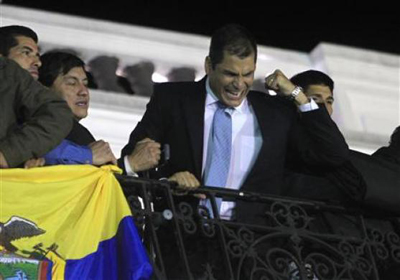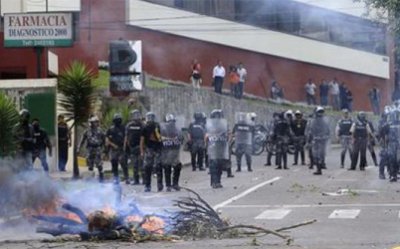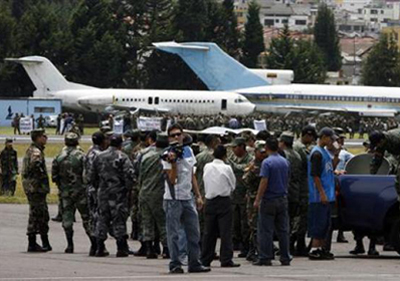|
3 October 2010 from VoltaireNet Website
Ecuadorean President Rafael Correa speaks from the balcony of the Carondolet Palace as hundreds of supporters gathered to greet him in Quito September 30, 2010.
Using the standard CIA playbook on toppling democratically-elected governments in Latin America, the Obama administration, which was not happy with Ecuadorian President Rafael Correa’s moves to increase state control over oil companies in the nation and his decision to oust the United States military from its airbase at Manta, appears to have suffered a major defeat in the failed coup attempt in Ecuador by police officers and Air Force personnel who were backed by rightist elements in the National Assembly and business community.
Correa was re-elected with an overwhelming majority last year after he gave the U.S. military its walking papers from the Manta airbase.
The Pentagon and CIA have been working to topple Correa
ever since by pumping money into opposition political parties and other
groups through NGOs funded by the U.S.
National Endowment for Democracy.
Correa’s predecessor, the pro-U.S. Lucio
Gutierrez, who is wedded to foreign oil company interests in the
country, was accused by the government of covertly supporting the police and
Air Force mutineers.
In fact, Clinton and Obama had given military
and political support to the right-wing junta that ousted
democratically-elected progressive President Manuel Zelaya in Honduras in
June 2009 and has fought against allowing the ousted democratically-elected
president of Haiti, Jean-Bertrand Aristide, to return to his country from
exile in South Africa after the CIA-engineered coup against him in 2004.
Riot police repel supporters of Ecuadorean President Rafael Correa from reaching the hospital where he took refuge for protection from police protesters, in Quito September 30, 2010.
And the fact that Correa, like Venezuelan President Hugo Chavez, who was briefly ousted in an April 2002 coup organized by the CIA, was held as a virtual hostage at the Police Hospital in Quito for the greater part of a day provided a grim reminder of an old CIA tactic in staging coups in Latin America.
Chavez was briefly held hostage on a Venezuelan island in the Caribbean while a U.S.-registered plane stood by to fly him into exile. In an emergency Latin American summit meeting in Argentina, Chavez saw the U.S. behind the events in Ecuador.
He said,
Chavez’s own experience with a CIA backed coup and the June 2009 coup, supported by the Pentagon, CIA, and Mossad against his ally Zelaya in Honduras, makes him an expert on CIA and Mossad tactics in the region.
Informed sources have told WMR [1] that Correa and Chavez are currently comparing notes on the coups launched against them.
[1] Wayne Madsen Report
In the 2002 coup attempt against Chavez, the US
embassy’s top CIA and DIA officers were discovered to be helping to direct
the coup from Venezuelan military installations.
The State Department’s "Investment Climate Statement" for Ecuador states:
Correa’s financial policies, as well as his foreign policy that saw him order out the American base at Manta and establish close ties with Venezuela, Iran, and other countries inimical to American and Israeli hegemony, placed a huge CIA and Mossad target on Correa’s back.
In June, Ecuador sponsored a resolution at the Organization of American State (OAS) summit in Lima condemning Israel’s attack on the Turkish aid flotilla transporting humanitarian aid to Gaza.
Ten nations voted with Ecuador in support of the resolution.
Ecuadorian army soldiers stand on the runway of the military airbase of the Mariscal Sucre International Airport to force its closure, in Quito September 30, 2010.
Israel also reportedly sold Python-3 air-to-air missiles to the Ecuadorian Air Force in 1997. Mossad also has its hooks into the Ecuadorian National Police, where the main coup plotters received support.
Mossad is chiefly tasked with spying on Ecuador’s large Ecuadorian-Arab community.
The activities of the Mossad station at the Israeli embassy in Quito before and during the coup attempt will also draw the attention of counter-intelligence officers.
Last year, Tel Aviv-based On Track Innovations received a contract to provide an electronic biometric-based electronic identification card system to Ecuador’s Central Registry Office.
|



